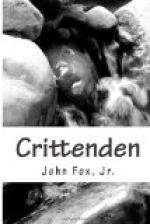“Come on, boys”—appealingly—“you’re not going back on me. Come on, you cursed cowards! Good! Good! I take it back, boys. Now we’ve got ’em!”
Another voice: “Kill me, somebody—kill me. For God’s sake, kill me. Won’t somebody give me a pistol? God—God....”
Once Grafton started into a tent. On the first cot lay a handsome boy, with a white, frank face and a bullet hole through his neck, and he recognized the dashing little fellow whom he had seen splashing through the Bloody Ford at a gallop, dropping from his horse at a barbed-wire fence, and dashing on afoot with the Rough Riders. The face bore a strong likeness to the face he had seen on the hill—of the Kentuckian, Crittenden—the Kentucky regular, as Grafton always mentally characterized him—and he wondered if the boy were not the brother of whom he had heard. The lad was still alive—but how could he live with that wound in his throat? Grafton’s eyes filled with tears: it was horror—horror—all horror.
Here and there along the shadowed road lay a lifeless mule or horse or a dead man. It was curious, but a man killed in battle was not like an ordinary dead man—he was no more than he was—a lump of clay. It was more curious still that one’s pity seemed less acute for man than for horse: it was the man’s choice to take the risk—the horse had no choice.
Here and there by the roadside was a grave. Comrades had halted there long enough to save a comrade from the birds of prey. Every now and then he would meet a pack-train loaded with ammunition and ration boxes; or a wagon drawn by six mules and driven by a swearing, fearless, tireless teamster. The forest was ringing with the noise of wheels, the creaking of harness, the shouts of teamsters and the guards with them and the officer in charge—all on the way to the working beavers on top of the conquered hill.




